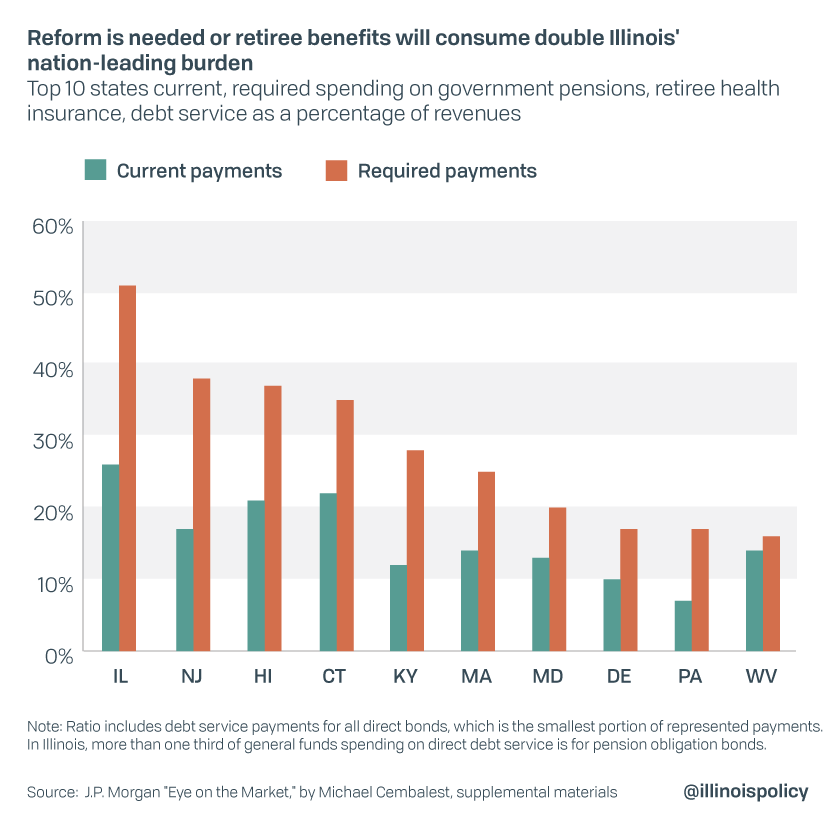No. 2 New Jersey confronts pension crisis as No. 1 Illinois dithers
The New Jersey Senate president is proposing solutions to the state’s pension problem. Illinois is worse off, but state leaders remain silent on reforms.
New Jersey’s pension problem is only second-worst in the U.S., but its state Senate President Stephen Sweeney, a Democrat, is pushing legislation he says will save taxpayers billions through meaningful pension reform.
Illinois’ pension crisis is the worst in the nation. Springfield’s response: crickets.
Sweeney has introduced 27 bills aimed at reforming the state’s pension system. The plan, called “Path to Progress,” is a response to annual pension payments set to double by 2023, eating up 80% of the state’s revenue growth.
Most changes only impact newer workers in moves similar to those already taken by Illinois. Limiting the affected employees severely limits the impact the 27 bills can have on New Jersey’s $100 billion pension deficit.
Sweeney’s plan transforms how those employed by the state for less than five years will receive a pension in the future. Current recipients and those who have been in the system longer than five years will see no changes.
Instead of a defined benefit system, Sweeney wants to shift towards a 401k-style plan that would promise a minimum 4% return on savings, which is a guarantee not offered by a traditional 401k. Higher returns would return more money to the state for investment into the pension system. A pension would still apply to the first $40,000 a worker makes, while the rest would be under the state-run 401k system.
Sweeney has also proposed changing the Affordable Care Act level for all public employees from platinum to gold so the state pays less money into health care.
Parts of the plan also change how the state handles health care for its workers. Sweeney wants to consolidate health care for school employees into an already existing plan with lower insurance costs. He says this could save schools $300 million a year. Only 30% of school districts are on the state plan, with the rest being private. New Jersey’s teacher pension system is so underfunded that a recession could shorten its lifetime to just four years without reform.
The objective of the plan is to keep the pensions promised to those already in the system while reforming it for the future recipients. Sweeney said his plan could allow for more reliable benefits without changing contribution amounts.
Sweeney previously worked with former Republican Gov. Reek to raise the retirement age to 65 and saved the state more money on retirement benefits. Under his new plan, the retirement age would rise to 67 for the newer workers.
The proposal has been met with fierce opposition, however. Sweeney holds significant political power in New Jersey, but his biggest opponent is Gov. Phil Murphy, also a Democrat. Murphy and public employee unions contend the bill takes away from those who dedicated their life to public service. If Murphy refuses to sign it, Sweeney plans to bring the issue directly to the voters as a constitutional amendment, bypassing the governor.
Consideration for Illinois
The only state that has a bigger pension problem than New Jersey is Illinois. Illinois spends a greater percentage of revenue on pensions, and a greater percentage on retiree health care, than any other state. Even so, it has the largest gap between what it pays and what it should pay. Currently 26% of state operating revenues go to retirement costs, but were Illinois to fully meet its obligations during the next 30 years it would need to dedicate 51% of its revenues to the task, according to research from J.P. Morgan.

Illinois tried to reform pensions in 2013. But the Illinois Supreme Court in 2015 struck down the reforms that would have fully funded pensions without reducing current obligations, saving the state billions. It ruled the Illinois Constitution prevented the state from diminishing benefits, even unearned future benefits.
If second-worst New Jersey realizes it must work on its pension problems, shouldn’t the state with the biggest crisis be doing something? By amending the state constitution to protect earned benefits, but allow for changes in future benefit accruals, state lawmakers could pass a pension reform package that reduces annual pension contributions and fully funds the pension systems faster than planned under current law. This plan would enable state and local governments to honor promises made to both retirees and current workers – and would not cut a dime from their checks.
State lawmakers just imposed 21 new or higher taxes and fees that will bleed $4.7 billion from the Illinois economy. None of that money is targeted to the pension system. Instead, Gov. J.B. Pritzker wants to amend the state constitution to eliminate flat income tax protections in favor of a progressive income tax.
His tax scheme is being sold with faulty rates that would do little to fill Illinois’ pension chasm. It also allows lawmakers to divide taxpayers into smaller groups and raise their taxes without the political blowback seen when taxes have been raised on everyone.
Illinois pensions cannot be fixed by progressive taxation without again raiding middle-class taxpayers’ wallets, harming the state economy and increasing poverty – just like in Connecticut, the only state to implement progressive taxation in the past 30 years.
New Jersey is trying to do something. Connecticut shows what not to do. Illinois leaders need to watch, learn and stop using tax hikes as their only solution.